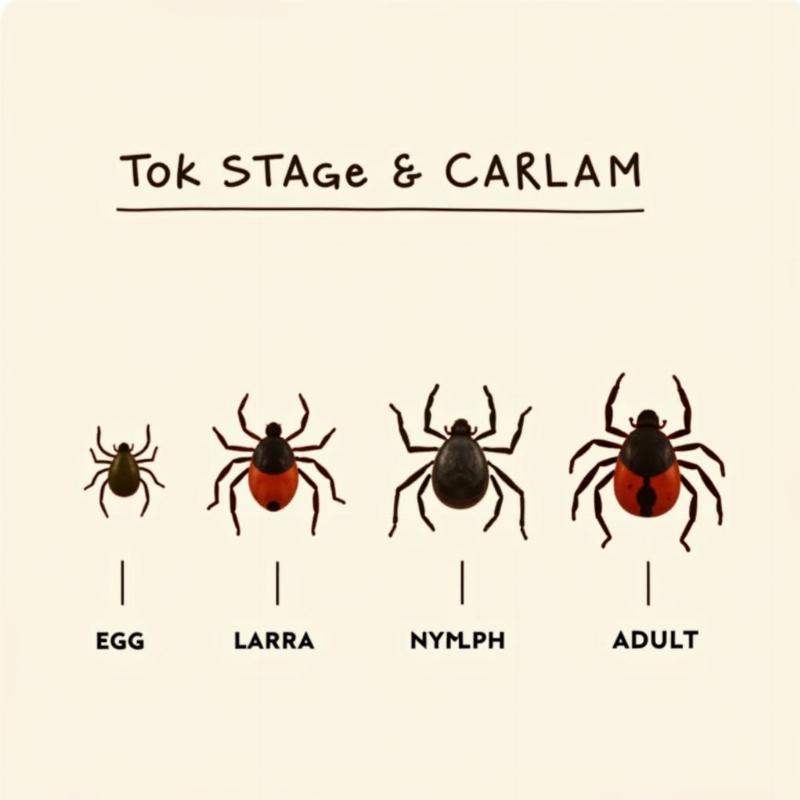Ticks are a common concern for dog owners in the US, and understanding their lifecycle, especially how long they can survive without a host, is crucial for effective prevention and treatment. Knowing how long these pesky parasites can linger in your home or yard without a blood meal can help you protect your furry friend from tick-borne diseases.
Understanding the Tick Lifecycle
Ticks go through four life stages: egg, larva, nymph, and adult. Each stage requires a blood meal to progress to the next, except for the egg stage. The duration a tick can survive without a host varies significantly depending on the species, life stage, environmental conditions, and the tick’s access to moisture. Generally, ticks are resilient and can survive for extended periods without feeding, especially in humid environments.
 Tick Life Cycle Stages
Tick Life Cycle Stages
How Long Can Dog Ticks Survive Off a Host?
The most common ticks affecting dogs in the US are the American dog tick, the brown dog tick, the deer tick (blacklegged tick), and the lone star tick. While their lifespans vary, they can all survive for months, or even years, without a host under the right conditions.
American Dog Tick
American dog ticks can live up to three years without a blood meal, particularly in humid environments.
Brown Dog Tick
Brown dog ticks are unique because they can complete their entire lifecycle indoors. They can survive for several months without a host in a home environment.
Deer Tick (Blacklegged Tick)
Deer ticks can survive for up to 18 months without feeding, often overwintering in leaf litter.
Lone Star Tick
Lone star ticks are also resilient and can survive for many months without a host.
Factors Affecting Tick Survival
Several factors influence how long a tick can survive without feeding:
- Humidity: Ticks thrive in humid environments. Dry conditions significantly reduce their lifespan.
- Temperature: While ticks can tolerate cold temperatures, extreme heat can be detrimental.
- Life Stage: Adult ticks can generally survive longer without a meal than larvae or nymphs.
- Species: Different tick species have varying survival capabilities.
Protecting Your Dog from Ticks
Knowing how long ticks can survive off a host emphasizes the importance of preventative measures.
- Regular Tick Checks: Check your dog for ticks daily, especially after spending time outdoors.
- Tick Preventatives: Use veterinarian-recommended tick preventatives, such as topical treatments, oral medications, or tick collars.
- Yard Maintenance: Keep your grass short and remove leaf litter to reduce tick habitats.
- Avoid Tick-Infested Areas: Stay away from areas with tall grass, brush, and wooded areas where ticks are prevalent.
Expert Insights
Dr. Emily Carter, DVM, a veterinary parasitologist, advises, “Regularly checking your dog for ticks is crucial. Even if you use preventatives, they are not 100% effective, and early detection can prevent the transmission of tick-borne diseases.”
She further adds, “Maintaining a tick-free yard is an essential part of protecting your dog. Regular landscaping and keeping the grass short can significantly reduce the tick population in your yard.”
Conclusion
Ticks can survive for surprisingly long periods without a host, making consistent preventative measures essential for protecting your dog. By understanding the tick lifecycle and implementing preventative strategies, you can significantly reduce your dog’s risk of tick-borne illnesses. Remember, regular tick checks and veterinarian-recommended preventatives are key to keeping your furry friend happy and healthy.
FAQ
- How do I remove a tick from my dog? Use fine-tipped tweezers to grasp the tick as close to the skin as possible. Pull straight up with steady, even pressure.
- What are the signs of a tick-borne illness in dogs? Symptoms can vary depending on the disease but may include fever, lethargy, loss of appetite, joint pain, and swollen lymph nodes.
- Are all ticks carriers of disease? Not all ticks carry disease, but many do, so it’s important to treat all ticks seriously.
- Can I get Lyme disease from my dog? Lyme disease cannot be transmitted directly from your dog to you. However, infected ticks can transmit the disease to both dogs and humans.
- What should I do with the tick after I remove it? Place the tick in a sealed container with rubbing alcohol to kill it.
Related Articles
how long can dog ticks live in a house
Beautdogs.us is your premier source for all things dog-related in the USA. We provide expert advice, breed information, product reviews, and comprehensive guides on dog care for both new and experienced dog owners. From understanding tick lifecycles to choosing the right food, Beautdogs.us empowers you to be the best pet parent possible. Contact us for expert guidance at [email protected] or +1 501-555-7529. Visit Beautdogs.us for more valuable information and resources for your beloved canine companion!